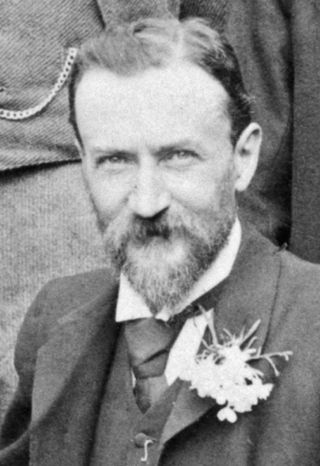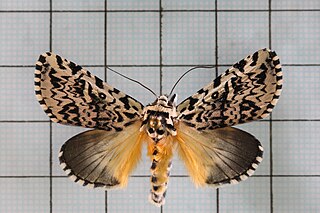Related Research Articles

Arthur Gardiner Butler F.L.S., F.Z.S. was an English entomologist, arachnologist and ornithologist. He worked at the British Museum on the taxonomy of birds, insects, and spiders.

Lithacodia uncula, the silver hook, is a moth of the family Noctuidae. The species was first described by Carl Alexander Clerck in 1759. It is found in the Palearctic realm.

Zanclognatha is a genus of litter moths of the family Erebidae. The genus was erected by Julius Lederer in 1857.
Koyaga is a genus of moths of the family Noctuidae. The genus was described by Ueda in 1984.

Deltote is a genus of moths of the family Noctuidae. The genus was described by Reichenbach in 1817.

Lithacodia is a genus of moths of the family Noctuidae.

Mocis is a genus of moths in the family Erebidae. The genus was erected by Jacob Hübner in 1823.

Bityla sericea is a species of moth in the family Noctuidae. This species is endemic to New Zealand. It is classified as "At Risk, Naturally Uncommon" by the New Zealand Department of Conservation.

Trichosea champa is a moth of the family Noctuidae first described by Frederic Moore in 1879. It is found in the Himalayas, north-east India, Sri Lanka, China, Taiwan, Japan, and Russia.

Ichneutica plena is a moth of the family Noctuidae. It is endemic to New Zealand. It is widespread throughout the North, South and Stewart Islands. It is a variable in appearance and therefore can be confused with its near relatives I. peridotea and I. insignis. The larvae of I. plena feed on herbaceous plants including Fuchsia excorticata, Coprosma species, and introduced species such as garden fuchsia as well as crops such as apple trees. Adults of this species are on the wing from late August until May.

Koyaga virescens is a moth of the family Noctuidae first described by Shigero Sugi in 1958. It is found in Japan and Taiwan.

Pseudodeltote formosana is a species of moth of the family Noctuidae first described by George Hampson in 1910. It is found in Taiwan.
Pseudodeltote brunnea is a species of moth of the family Noctuidae first described by John Henry Leech in 1889. It is found on the Japanese islands of Hokkaido, Honshu, Shikoku and Kyushu.

Pseudodeltote coenia is a species of moth of the family Noctuidae first described by Charles Swinhoe in 1901. It is found in Taiwan.
Protodeltote wiscotti is a species of moth of the family Noctuidae first described by Otto Staudinger in 1888. It is found in the Russian Far East and Japan.
Protodeltote distinguenda is a species of moth of the family Noctuidae first described by Otto Staudinger in 1888. It is found in Korea, Taiwan and Japan.
Protodeltote inexpectata is a species of moth of the family Noctuidae first described by Ueda in 1984. It is found in Japan.
Micardia argentata is a species of moth of the family Noctuidae first described by Arthur Gardiner Butler in 1878. It is found in China, Korea and Japan.
Koyaga numisma is a species of moth of the family Noctuidae first described by Otto Staudinger in 1888. It is found in Russia, China, Korea and Japan.
Koyaga senex is a species of moth of the family Noctuidae first described by Arthur Gardiner Butler in 1881. It is found in Japan.
References
- 1 2 Ueda, Kyoichiro (March 20, 1987). "A revision of the genus Deltote R. L. and its allied genera from Japan and Taiwan (Lepidoptera: Noctuidae; Acontiinae): Part 2. Systematics of the genus Deltote R. L. and its allied genera" (PDF). Bulletin of the Kitakyushu Museum of Natural History. 6: 33–35.
- ↑ Butler, Arthur G. (1885). "Descriptions of Moths new to Japan, collected by Messrs. Lewis and Pryer". Cistula Entomologica. 3 (29): 132–133.
- ↑ Hampson, George F. (1910). "Lithacodia falsa". Catalogue of the Noctuidae in the Collection of the British Museum. Catalogue of the Lepidoptera Phalaenae in the British Museum. Vol. 10. London: Taylor and Francis. pp. 541–542.